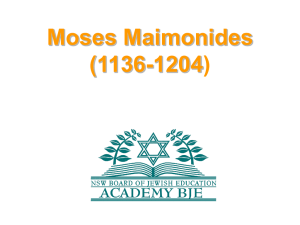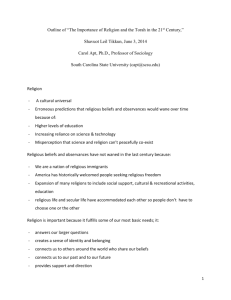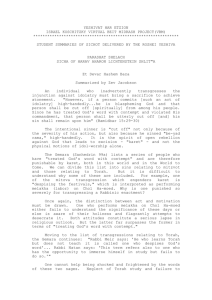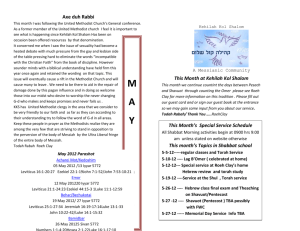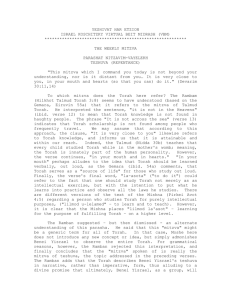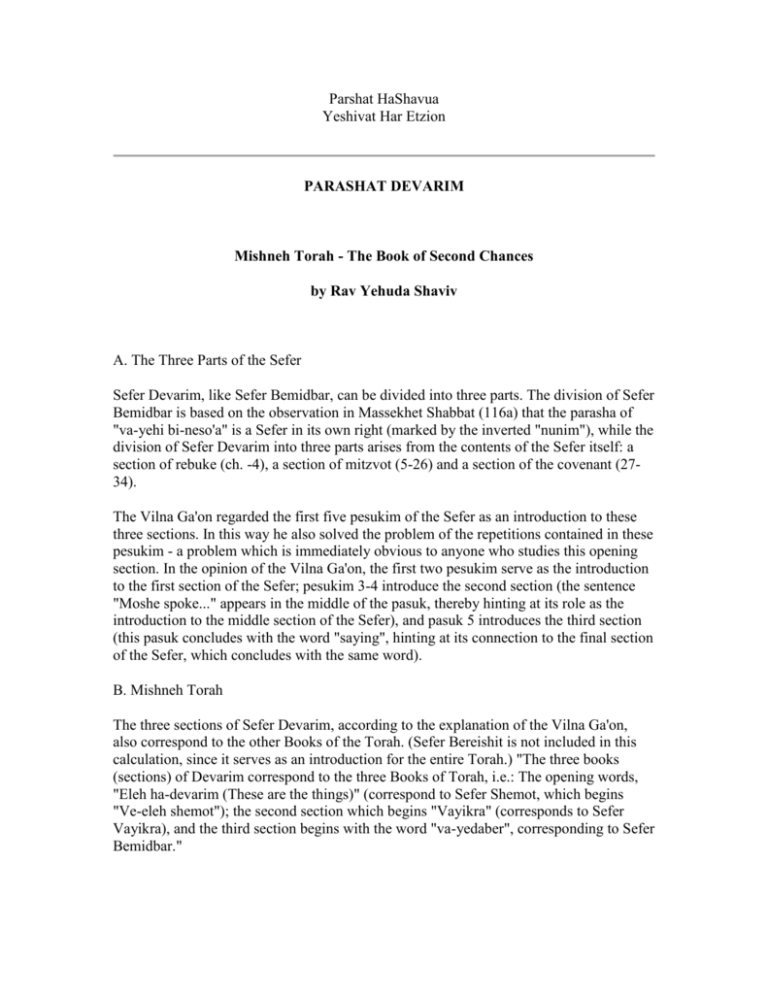
Parshat HaShavua
Yeshivat Har Etzion
PARASHAT DEVARIM
Mishneh Torah - The Book of Second Chances
by Rav Yehuda Shaviv
A. The Three Parts of the Sefer
Sefer Devarim, like Sefer Bemidbar, can be divided into three parts. The division of Sefer
Bemidbar is based on the observation in Massekhet Shabbat (116a) that the parasha of
"va-yehi bi-neso'a" is a Sefer in its own right (marked by the inverted "nunim"), while the
division of Sefer Devarim into three parts arises from the contents of the Sefer itself: a
section of rebuke (ch. -4), a section of mitzvot (5-26) and a section of the covenant (2734).
The Vilna Ga'on regarded the first five pesukim of the Sefer as an introduction to these
three sections. In this way he also solved the problem of the repetitions contained in these
pesukim - a problem which is immediately obvious to anyone who studies this opening
section. In the opinion of the Vilna Ga'on, the first two pesukim serve as the introduction
to the first section of the Sefer; pesukim 3-4 introduce the second section (the sentence
"Moshe spoke..." appears in the middle of the pasuk, thereby hinting at its role as the
introduction to the middle section of the Sefer), and pasuk 5 introduces the third section
(this pasuk concludes with the word "saying", hinting at its connection to the final section
of the Sefer, which concludes with the same word).
B. Mishneh Torah
The three sections of Sefer Devarim, according to the explanation of the Vilna Ga'on,
also correspond to the other Books of the Torah. (Sefer Bereishit is not included in this
calculation, since it serves as an introduction for the entire Torah.) "The three books
(sections) of Devarim correspond to the three Books of Torah, i.e.: The opening words,
"Eleh ha-devarim (These are the things)" (correspond to Sefer Shemot, which begins
"Ve-eleh shemot"); the second section which begins "Vayikra" (corresponds to Sefer
Vayikra), and the third section begins with the word "va-yedaber", corresponding to Sefer
Bemidbar."
Hence it is most appropriate that Chazal referred to Sefer Devarim as "Mishneh Torah"
(lit. "second Torah"), since in this Sefer - and especially in the section of the mitzvot - we
review material which we have already learned in the previous Books.
C. Did Moshe Compose These Words Himself?
In this Sefer we see both repetition and innovation. The Gemara, in Massekhet Megilla
(31b) addresses the difference between the warning (blessings as well as curses) in Sefer
Vayikra and the warning in Sefer Devarim, and notes as follows: "The former are
formulated in the plural, and Moshe conveyed therein a Divine message, while the latter
are in the singular and Moshe composed them himself."
In the Sefer Ha-Zohar this distinction is widened to include the entire Sefer Devarim: "----; Moshe composed it himself." (Zohar Devarim, 261a). This assertion, despite its
support in the first-person wording of the Sefer, nevertheless contradicts the very basis of
our faith in the Divine origin of the entire Torah. The Rambam, in his Laws of Teshuva
(3:8), rules as follows: "Three fall into the category of heretics who deny the Torah:
Someone who says that the Torah is not from God; if he says of even one pasuk or even
one letter that MOSHE COMPOSED IT HIMSELF, then he is a heretic". The source for
this ruling is to be found in a beraita in Sanhedrin 99a. In fact, the Zohar itself poses a
similar question: "What does 'composed it himself' mean? Can one imagine that Moshe
said even one single letter of the Torah of his own initiative?"
This problem can be solved by means of an observation by the Abarbanel. The Abarbanel
maintains that at first Moshe indeed said these words of his own initiative, but afterwards
God commanded him to write, and He dictated the same words in exactly the same way
as He had dictated the previous Books. Hence, according to this opinion, there is nothing
unique about the nature of this Sefer, since we have found similar instances in the other
Books as well: various personalities who appear in the Torah (Pharaoh, Bil'am and
others) uttered their own words, and eventually God dictated their words back to Moshe,
and they have been included ever since as an integral part of God's Torah. Hence what
sets Sefer Devarim apart is not a qualitative difference but rather a quantitative one here, the great majority of the Sefer was recorded in this fashion.
D. The Sefer of Teshuva
If we seek some unique feature of this Sefer we shall discover that one of its
characteristics - if not the crux of its whole message - is the concept of a "second
chance". In other words, even if one has failed and sinned, there is always an opening for
repair and improvement, for change and renewal. Hence the mention of a new mitzva in
our Sefer - a mitzva mentioned for the first time qua mitzva: "For this mitzva which I
command you today, it is not too wondrous for you, nor beyond your reach... for the
matter is very close to you, in your mouth, in your heart, to perform it." (30:11-14). The
Ramban (after first attempting to interpret the expression "this mitzva" as referring to the
entire Torah) explains, "But 'this mitzva' refers to teshuva. The words, 'and you shall
return it to your hearts' and 'and you shall return to the Lord your God' - define a mitzva;
we are being commanded to act in this way... And this is the reason why the Torah says,
'in your mouth, in your heart, to perform it': They should confess their sins and those of
their fathers verbally, and return in their hearts to God and accept the Torah upon
themselves that day, to fulfill it for all generations...".
Teshuva is not presented here simply as a mitzva, but rather as a thoroughly attainable
possibility which holds a promise of hope. Obviously, as any other mitzva, it has
boundaries and regulations, and not everything that a person decides of his own initiative
to do is automatically considered as teshuva. This idea becomes apparent from the very
start of the Sefer, where the story of the spies is recorded. When the nation received the
news of the harsh decree that had been imposed upon them - that they would not merit to
enter Eretz Cena'an - some of them reacted in a way which could be interpreted as
teshuva: "And you answered and said to me, 'We have sinned, we shall ascend and we
shall fight just as the Lord our God has commanded..." (1:41). But this "teshuva" on their
part was not accepted, and they were struck down by the Emorites living on the
mountain. Despite their regret and their tears before God, nevertheless "God did not
hearken to your voice and did not listen to you." (1:45)
E. Innovation of Mitzvot in Sefer Devarim
Let us turn our attention to some mitzvot which are first introduced in our Sefer. The
Ramban, in his introduction to the Sefer, addresses some of them: "And in this Sefer a
few mitzvot are added which have not been mentioned previously at all, such as yibum
(the obligation of a man to marry his deceased brother's wife if he died childless), the law
concerning defamation of character, divorcing a woman, conspiring witnesses (a special
category of false witnesses who claim to have witnessed an event when neither of them
was in the vicinity at all) and others... And they were all conveyed to Moshe at Sinai, or
in the Tent of Meeting some time during the first year, prior to the spies being sent, since
on the Plains of Mo'av (just prior to the entry into the Land) Moshe received no new
messages except for the formulation of the covenant... But these mitzvot were not
recorded in the earlier Books, to be conveyed to the generation which had left Egypt, for
perhaps these mitzvot were to be fulfilled only in Israel, despite the fact that they are an
obligation to be physically fulfilled, as in the case of the libations, or otherwise they were
mentioned only to the later generation which was to enter the land because they are
mitzvot which do not frequently occur."
If we perceive the idea of a "second chance" as a cemessage of the Sefer, it is easy to
understand why the mitzva of yibum is mentioned here. This mitzva comes to teach us
that even if a person has died without leaving any descendants, all hope is not lost for his
name and legacy to be continued, and for this important purpose the Torah goes so far as
to permit the usually forbidden union with one's brother's wife.
The same can be said for the subject of divorce. A man and woman enter into the
covenant of marriage, hoping to set up a home together, but unfortunately the covenant
does not hold up, and it is apparent that there is no hope for this union. Is this couple
obligated to remain together even though they cannot bear to live with each other? The
Torah's solution is, "And she shall go out... and SHE SHALL BE (the wife) OF
ANOTHER MAN." (24:2) There is a formal procedure for divorce and dissolution of the
marital bond, with the aim that hopefully these two people will be able to establish homes
and futures with other partners.
Something of the same idea exists in the case of "conspiring witnesses", too. The Torah
has already instructed that "a matter is established by the word of two witnesses or by the
word of three witnesses" (19:15). Thus the testimony of the witnesses is the formal and
reliable basis for judgment in cases where a deed was witnessed. But, teaches Sefer
Devarim, let us not get carried away with formal rigidity. Even this seemingly firm basis
can sway and crack, and the Torah provides a legal framework for the rejection of their
testimony and for their punishment.
From here we turn to the very institution of justice and the legal establishment. Although
the Ramban does not mention it, the mitzva of appointing judges for each city is also an
innovation of Sefer Devarim. Several fundamentals of the Torah's legal system are
detailed in parashat Shoftim and in parashat Ki Tetze, and right at the beginning of the
Sefer we find an extensive description of the appointment of the judges, in what seems to
be out of the narrative context (1,9-7).
In truth, the whole essence of the legal system is an attempt to deal with deficiencies in
the order of life. When some problem arises, whether in the realm of interpersonal
relationships or a conflict between the individual and society - or even in the relationship
between man and God - the legal system is there to restore order, either by its decision or
by application of the appropriate punishment.
This may be part of what Chazal meant when they taught: "Any judge who renders a
genuinely true judgment even only on one occasion - the Torah regards him as though he
became God's partner in the Creation." (Shabbat 10a) It is conceivable that in some sense
he becomes a partner of God, for the King of the Universe certainly watches and judges
the whole world, but why does he become God's partner specifically "in the Creation"?
The answer may be that wicked individuals who cause perversion and injustice are in fact
causing damage to the fabric of life in the world and are spoiling the work which the
Creator did during the days of Creation. Whoever restores judgment and order therefore
becomes God's partner - retroactively, as it were - in the Creation.
F. Mitzvot Pertaining to the Community
All details of social organization - administration, institutions and regime - are an
innovation of this Sefer. This category includes the mitzva of appointing a king and all
the detailed halakhot pertaining to this institution, as well as the institution of prophecy,
the halakhot of going out to war, etc. Almost everything which is codified in Rambam's
Hilkhot Melakhim, as well as a sizable portion of the halakhot pertaining to the
Sanhedrin and laws of testimony, appear for the first time in Sefer Devarim.
Let us try to understand why these mitzvot appear specifically - and only - in Sefer
Devarim. Perhaps, since they are mitzvot which pertain to the nation as a whole rather
than to each individual, it was not appropriate for them to be mentioned in those Books
which deal with the sojourns of the nation in the desert, for at this stage they were still a
group of individuals, not having acquired the status of a nation in its land. It is only as
they are about to enter Eretz Yisrael that the nation assumes a collective identity, and at
this point it is appropriate to introduce "national mitzvot".
However, there may be an additional reason for this phenomenon. Concerning one
particular mitzva in Sefer Devarim, Chazal taught that "The Torah so instructs only as a
measure against the yetzer ha-ra" (Kiddushin 21b). This is the mitzva of the "yefat to'ar" the beautiful gentile woman captured on the battlefield, whom "if the Holy One, Blessed
be He, had not permitted (to the Israelite man) then he would have married her even
illegally" (Rashi on 21:11). This concept of "concession to the yetzer ha-ra" can be
extended to many other communal mitzvot, such as that of warfare and perhaps even also
the mitzva of appointing a king. This idea is based on the words of Rabbi Nehorai in
Sanhedrin 21b: "This parasha was only given in response to their grievances."
"Grievances" can be regarded as being in the same category as the yetzer ha-ra.
Mitzvot which are given as measures against the yetzer ha-ra are a type of "bediavad"
(after the fact, less than ideal) mitzva, as it were, which arise from a penetrating view of
this world with all its weaknesses and crises; these are mitzvot which attempt to correct
even the yetzer ha-ra itself, gradually, and to create order and procedure even amidst
chaos and crisis. Perhaps the entire institution of social control may be viewed as a means
to rectify a missed opportunity of the individual. By extension, the same purpose can
certainly also be attributed to such personal mitzvot as divorce and conspiring witnesses.
G. Wherever We Call Unto Him
The theme of the "second chance" is also emphasized in Moshe's speeches of rebuke.
Even if the nation has sinned, the possibility of correction still exists. For this purpose
Moshe goes so far as to put his fate at stake as against that of the nation. At the opening
of parashat Va-et'chanan Moshe recounts his attempts to change God's decree against him
by prayer and supplication. But he was halted from on High: "You have spoken too
much; do not speak to Me any longer on this matter" (3:26). Immediately thereafter, we
read: "And we stayed in the valley, facing Beit Pe'or... And now, Israel, hear the
statutes..." (3:28-4:1) At first we don't detect any textual difficulty or hint here. But Rashi
explains: "You were in close proximity to idolatry (Ba'al Pe'or), but nevertheless, 'Now,
Israel, hear the statutes...'. In other words, all was forgiven you, but I did not merit that
my sin be forgiven."
Is this not the power of the community - that the Heavenly doors are never closed before
it?! "But as part of a community, so long as they engage in teshuva and cry out with a
sincere heart - they are answered, as it is written, "As the Lord our God whenever we call
unto Him." (Rambam, Laws of Teshuva, 2:6).
H. Before All of Israel
But we shall see that this power is revealed with much greater clarity at the conclusion of
the Sefer, in the description of the greatness of Moshe: "And no other prophet arose in
Israel like Moshe... for all the signs and wonders which God sent him to perform in the
land of Egypt... and for the strong arm and all the great terror which Moshe performed
before the eyes of all of Israel."
What was it that Moshe did "before the eyes of all of Israel"? Rashi explains, "Before all
of Israel - that his heart led him to shatter the tablets before their eyes, as it is written,
'And I shattered them before their eyes', and God approved of his action, as it is written,
'which you broke' - you did well in breaking them."
Hence we may perhaps say that it was this great deed which created the possibility of a
continuation, the possibility of correction within the camp, the possibility of prayer and
the sculpting of new tablets upon which the ten commandments would once again be
written. The shattering of the first tablets as a result of the golden calf episode teaches us
abthe possibility of building anew, on the ruins of the old.
Proof of this is to be found in the fact that the repetition of the ten commandments in
parashat Va-et'chanan, in our Sefer, are - with some adjustments - the commandments
which were written on the second tablets (according to the Maharal, in Tiferet Yisrael,
end of chapter 44). This is the very definition of Mishneh Torah - the Torah repeated a
second time, amidst conflict and following conflict with the yetzer ha-ra.
Further study:
1. In Parashat Devarim, Moshe recounts those events which explain the PRESENT
situation of the Jews in ARVOT MOAV - the incident of the spies, the path taken to
avoid Edom and Moav, the wars with Sichon and Og. Why is the appointment of judges
38 years earlier included (1,9-7).
2. In the descriptions of Edom, Moav, and Amon, the Torah details which nations
previously occupied those territories (2,11-12;20-23); even repeating this information, in
the case of Edom, three times. What is the significance of this detail in Moshe's speech?
(Add to this list the historical place-name details given in 3,9;13-14).
To receive the parsha shiur every week, write to: majordomo@etzion.org.il
With the message:
Subscribe yhe-parsha <your name>
This shiur is provided courtesy of the Virtual Beit Midrash, the premier source
of online courses on Torah and Judaism - 14 different courses on all levels, for all
backgrounds.
Make Jewish learning part of your week on a regular basis - enroll in the
Virtual Beit Midrash
(c) Yeshivat Har Etzion1997 All rights reserved to Yeshivat Har Etzion
Yeshivat Har Etzion
Alon Shvut, Israel, 90433
office@etzion.org.il

